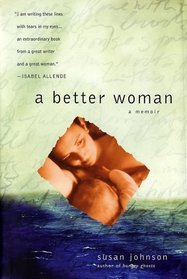Helpful Score: 1
This one had been in my tbr stack(s) for some time and I finally got to it this past month. I think somewhere, somehow, she must have been related to us, because everything that could go wrong for her, certainly did. I wasn't thrilled with her writing style, but then I'm not getting paid like she is, and I'm sure that some would give it a higher mark than I do. I learned some things about the female anatomy that I didn't know and read some things about motherhood that I already did.
Helpful Score: 1
At the age of 35, Susan Johnson realizes that she desperately wants to be a mother. At 38 she is pregnant with her first child, moving back her to homeland of Australia, and getting ready to "settle." Although deliriously happy with her new baby and new life, she realizes that something isn't quite right and is soon diagnosed with a recto-vaginal fistula, something that is practically unheard of in the Western world (although prevalent in developing countries). This memoir is Susan's story--about life as a new, first-time, older mother. Settling down with a man who isn't really the settling down type. Attempting to remain a surviving writer. And dealing with a rare medical condition that can be painful, not to mention embarrassing and humiliating.
I really did not enjoy the book at first. It wasn't until about halfway through that I really started to not only get into the book, but really even cared about her story. She doesn't really talk about the fistula until the midway point, and I guess I was just waiting for that. It's probably also important to mention that I am not really a fan of "literary memoirs" (as my sister says: it's probably really great. I did not think the first half was great). I prefer the more gritty, real writing to the pretentious, flowery writing that she has. Looking back, I can see that the first half of the book was probably fine; it just didn't really have anything to do with the reason I picked up the book in the first place. One thing I loved, though; is that Johnson has some wonderful phrases that are immensely quotable. Example: "Having children exposes you. I will know who you are when I see how you wish your children to live." And "Isn't it a form of arrogance to assume that misfortune will not personally visit you, or to allow yourself to believe the man who says his love for you is endless as space?" I really liked that she got into a bit of feminist theory and quoted/discussed Germaine Greer. I also thought she had a wonderful observation on the recent prominence of what she describes as the "earth-mother hierarchy"--where the focus on getting back to natural childbirth, home births and midwives forgets that "birth involves danger." Overall, I enjoyed the book a lot. And when I forget about the first half, I love it.
I really did not enjoy the book at first. It wasn't until about halfway through that I really started to not only get into the book, but really even cared about her story. She doesn't really talk about the fistula until the midway point, and I guess I was just waiting for that. It's probably also important to mention that I am not really a fan of "literary memoirs" (as my sister says: it's probably really great. I did not think the first half was great). I prefer the more gritty, real writing to the pretentious, flowery writing that she has. Looking back, I can see that the first half of the book was probably fine; it just didn't really have anything to do with the reason I picked up the book in the first place. One thing I loved, though; is that Johnson has some wonderful phrases that are immensely quotable. Example: "Having children exposes you. I will know who you are when I see how you wish your children to live." And "Isn't it a form of arrogance to assume that misfortune will not personally visit you, or to allow yourself to believe the man who says his love for you is endless as space?" I really liked that she got into a bit of feminist theory and quoted/discussed Germaine Greer. I also thought she had a wonderful observation on the recent prominence of what she describes as the "earth-mother hierarchy"--where the focus on getting back to natural childbirth, home births and midwives forgets that "birth involves danger." Overall, I enjoyed the book a lot. And when I forget about the first half, I love it.




